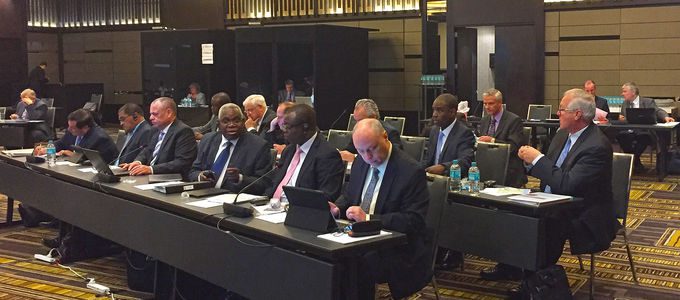
Apostles around the world are involved in building our conception of ministry. What has been gathered in meetings and working groups to date is currently being discussed by the District Apostles in Perth. Here is an overview.
Why are we talking about our conception of ministry in the first place?
With the publication of the Catechism in 2012, the New Apostolic Church presented the first comprehensive reference work in its 150-year history. The whole of chapter 7 is dedicated to the question: How do we understand the term “ministry”? “Now we have follow-up questions to deal with,” Chief Apostle (ret.) Leber already made clear in 2013.
What is the procedure with such deliberations?
Since February 2014, the Working Group Questions of Faith has been busy gathering the basics, from theological reflections to historical background. The specialist group evaluates and processes complex questions and develops possible answers. This is what the International District Apostle Meeting has been deliberating over regularly since March 2015. In some points, decisions are taken while others are referred back to the working group with questions.
Why are so many Apostles involved?
For one, the Catechism defines the apostolate as the ministry authoritative for doctrine. Secondly, the development of a new conception of ministry also has cultural dimensions. Following an initiative by Chief Apostle Jean-Luc Schneider, all Apostles—of which there are currently some 350—are included in the discussions. Their input usually happens in writing. However, the Chief Apostle has also taken advantage of continental Apostle conferences, such as in April and May 2016, to speak about this personally with the Apostles from Europe, America, Australia, and Asia.
What is the basic structure of our conception of ministry?
The Catechism recognizes three levels of ministry, each with different spiritual powers:
- the diaconal ministry, which has the power to proclaim the word of God.
- the priestly ministries, which moreover have the mandate and authority to dispense Holy Baptism, to proclaim the forgiveness of sins, and to consecrate Holy Communion and dispense it.
- the Apostle ministry, which furthermore has the power to baptize with the Holy Spirit and to ordain ministers.
What about the ministerial levels in between?
The further differentiation—for instance of the priestly ministries—goes back to a fundamental idea of the Catholic Apostolic Church to restore the church to its original form. A look at all relevant Bible passages shows that the early church did not have a consistent structure of ministers in place. For example, both elders and bishops originally had the same function as a rector does today. Which term was used depended on the church they led, whether it was a congregation of Jewish Christians or rather Greeks.
How long will these deliberations still take?
There is no schedule and no pressure to bring the debate on the conception of ministry to a close. In any case, the Chief Apostle and the District Apostle Meeting really want to deliberate on these fundamental questions and make a decision supported by a broad consensus. The Chief Apostle’s motto is: “We will take the time we need for this.”
What are the guidelines for this decision-making process?
The way the District Apostle Meeting works is something the Chief Apostle mentioned on the side of a divine service once: with heart, soul, and reason. The conference begins with a prayer, which is followed by the acquisition of knowledge, and finally an exchange of experiences and perceptions. “At times we become aware that we still do not have enough information on a certain subject, which means that we must simply gather more knowledge. On other occasions we notice that we need more time to talk about things. But very often we also feel that we need more of the Holy Spirit: let us pray more often and more sincerely.”
Photo: Peter Johanning




